QuestionQUESTION: i was coresponding with Natasha first, but she went on vacation. Hopefully you can help.
This is what i wrote to her on march 16.-------------
"My female mouse is on her 20th day of her first pregnancy. Last night when i went to bed, no babies, when i woke up there were two pups in the nest but Cheza still had at least 4 more lumps in her belly! She was sleeping in the corner when i found her, and the nanny was with the two pups when i checked the nest. There were no signs of labor continuing, her vagina was back to mousy normality, i'm just worried! I'm wondering what caused her to stop after two, take a nap and then return to the nest?(Shes been in there for about 2 hours now) and will she finish having her litter? (I also have a cat, but she has never been aggressive towards my mice, snakes, or birds. She even gives my mice tongue baths lol. Could my kitty stress cheza out?) Thank You for your help! Cheza is my favorite female, i raised her mother, and her grandmother, I would hate to lose her..."
Natasha's reply was---------
"If Cheza is used to the kitty, and nothing unusual happened, that should not be the problem. I'm not a mouse obstretician :) so I don't know all of the possibilities; but if she does not continue to give birth, it is possible that the remainder of the pups (perhaps dead already- that could be why this happened) will either be expelled later (which isn't very pretty, but maybe she will spare you the sight), or will be absorbed back into her body. That's not a guarantee; and if you want to be careful, you can bring her to the vet-- but this is pretty hard to do without stressing her out, which endangers the other pups. I hope that when you read this, the problem will have already alleviated itself. The very best of luck to her and her babies."
The current situation and questions are as follows-------------
Cheza has delivered 4 stillborns so far over 3 days, the last one was on monday. She still has the 2 origional live pups, they are doing very well,their fat and happy. Cheza still has one fetus left in her belly i can feel. She has begun to worry me because i very rarely see her eat or drink,(in 24 hours she came out once on her own, without prompting, drank for five secounds, ate about 10 mouthfuls and went back to the nest for another day) The shape of her body compleatly changed a couple days after the delivery of her last stillborn pup on the 18th. Her sides (below her ribs and above her hips) have sunken in visably and i can feel her backbone between them. Her belly is also sagging down way lower than a normal post-birth mother mouse belly. Do you know of any reasons for these changes in her apperance?
Is it normal for them to not eat or drink often while they are absorbing a fetus?
It has been almost a week so far and i can still feel the dead baby in her belly, it has gotten rather firm recently, how long will it take for the fetus to be absorbed and dissapear?
And the last thing that I am wondering is since she had complications with this delivery,(She had a compleatly normal pregnancy, no accidents or stress that may have caused this that i know of) but since it is also her first pregnancy, Could I ever breed her again after she recovers? (I would baby her for 3-4 months before i breed her again) :) she deserves a good pampering after this!
Would it be safe to ever breed her again? And how likely would it be that she would have the same problem with future pregnancies? (Percentage wise, 50, 75, 100% likely to happen again?)
Another thing that worries me is that she has been leaking a light reddish-brown tinted fluid out of her vagina since she delivered her pups on the 16th, its a very slow flow, but it hasnt stopped yet,and there is no smell to it that i have noticed, is there any reason for this? Is it because of the absorbtion of the fetus, or could it be sepsis developing (i hope not...) or some other reason?
Cheza is my absolute favorite, most friendly and best hand tamed mouse, I would really enjoy for her to be able to have more pups (Because her pups would be calmer than any pups from my more spooky semi-tamed females) but if she cannot breed because of any adverse effect it might have on her health, or enjoyment of life, i will not be dissapointed, and i will not breed her, I enjoy her company immensly, she dosn't have to be a mama to be loved and cherished by me.
I'm sorry that i have typed out so many questions for you to try and answer, I'm just very concerned about my Cheza, and i'm also very curious about the reasons behind these complications and problems that she has had. I want to have better knowledge of a situation like this in case it ever happens again in the future i will know what to expect and how to help.
I've been breeding for about 4-5 years, but this is the first serious problem i've ever had.
Once I had a sterile female mouse. she lived with my stud male and never got pregnant, even though he breed her many times that i saw. I left her with him for about one and a half years then found her a forever home :)
On a different subject could you give me advice on anything that might help her to recover better, faster or easier?
She is currently on a diet of mouse/rat blocks, puppy formula 'iams' milkbones, and the strawberry yogurt rodent treat drop thingies, what else could i give her that might help? Any fruits, veggies, or suppliments you would recommend?
THANK YOU soooo much for the knowledge you are going to share with me, it will help me reduce the anxiety that i have had over Cheza's conditions, her overall health, and her recovery from this.
Cheza seems to be doing ok at this time, so its not an emergency. You can take your time and research anything you need to in order to answer the many different questions that i have put into this letter for you. (again, sorry there's so many...) Hopefully i will hear from you soon, but no rush.
Once again Thank you so much for helping me, and for helping all the other worried mouse owners out there too!
~Ruby
ANSWER: Hi Ruby,
I did need to do a little research, but hopefully she is still doing okay. If she has since passed the fetus or remaining tissue, most of this won't really apply anymore, so please feel welcome to write me a followup with her updated condition and I will respond more promptly.
It may be that she is eating and drinking appropriately, but only when you aren't looking. Since this is her first litter, you unfortunately don't have anything to compare against to see if this is her normal routine or not - some mommas will only come out when no one is around so that they can protect their nest, while other mommas will come out more when you are near to distract you from babies, and still others go about their lives normally. However, the loose skin can be indicative of dehydration, which can lead to low milk production, so if you can move the bottle closer to her nest or provide moist foods each day it may help her to keep appropriately hydrated. Every pregnancy and every mouse is different, so whether or not any of her mannerisms or appearances are "normal" is kind of hard to say.
I would personally strongly discourage breeding her again. Not only do complications during pregnancy and birthing put her life in danger, but they can also be passed on to her pups. It just isn't worth the risk, in my personal opinion, but ultimately it is up to you. While I cannot guess at what specifically led to her difficulties during this pregnancy, one possibility is genetics. She could have hereditary or developmental problems in her reproductive system, or what I think is more likely, she could be passing on lethal genetics to her offspring. This is a very common cause of reduced litter size and stillbirths, actually. Lethal genes are those that are fatal either in utero or shortly after birth when two copies are passed on (recessive), one from each parent. This would mean both parents had to be a carrier, and some of the pups inherited a pair, leading to their passing on, while the two survivors may have only inherited one or none, leading to a healthy life but a risky breeding future. Without knowing more about her genetics and that of the buck I can't guess if this is a cause, so I can't give you a percentage on the likelihood of it happening again, unfortunately. That uncertainty is why I would advise against trying again.
Regarding her diet, it sounds like you are doing a wonderful job! You could also try adding moist foods to her diet each day to help with dehydration, such as scrambled eggs made with puppy/kitten milk replacement or water instead of cow's milk, or even bits of stale bread soaked in water. Of course, any moist foods that aren't eaten will need to be removed after a few hours to prevent molding. The only other recommendation I have is to check the ingredients on the puppy biscuits - some are preserved with BHA, which is kind of nasty and may be harmful. Biscuits are GREAT sources of protein, as are puppy and kitten kibble, so it's really a wonderful idea to include them like you have been for pregnant/nursing does. :)
I saved sepsis for last, because it is kind of a big topic. The lump you are feeling may be a pup, but it could also be retained placental tissue, a swelling or hardening of one horn of the uterus (a sign of infection), or even a partially absorbed fetus. I cannot tell you from here what is going on, and because sepsis can absolutely be life threatening, I have to recommend taking her to a vet familiar with mice. Here is what I can tell you about infection and sepsis:
Signs may include - discharge (this may be the discharge you are talking about, or it might not, I cannot tell you from here, but a vet could), swelling, fever, dehydration, loss of appetite, lowered milk production, neglecting pups, and increased heart rate. A diagnosis needs to be made by a vet, however, who can test the discharge, as well as give her fluids, a physical exam, and palpate her abdomen. Treatment would mean antibiotics (which are frequently unsafe for nursing pups), fluids, and trying to prevent a systemic infection as much as possible. Your vet may also recommend hand raising the surviving pups yourself, depending on if he or she feels an infection may be passed through the breast milk, or if antibiotics are not safe enough.
This is really not something I would wait on if possible. I am sorry it took me so long to get back to you, but hopefully she has improved on her own by now. It is just so clear that you love her and care about her, so I would not take any risks if you can avoid them. I would suggest calling your vet before going in, however, in case they can come to you since you have new pups, or at least reduce wait time so you can upset them as little as possible. If you do take them in, take in the entire cage, and if you can, get someone else to drive you so that you can hold them steady for the trip. Just speak with the vet first to be sure you are following their best advice - I am not a professional, and they will know what to do!
I'm sorry that was such a long response, but hopefully I answered all of your questions! If you need anything else please let me know and I'll be happy to help out.
Best wishes!
-Tam
---------- FOLLOW-UP ----------
QUESTION: Well, so far so good, the discharge has stopped, the pups are doing well they are both fat and happy, and i have noticed that she has become much more active around the cage, and more social towards me again, instead of hiding away. her appitite has also improved greatly! She looks to be recovering slowly.
The genetics make the most sense of causing the problem. Cheza's mom is black, but she has the yellow hair around the base of her ears and privates that identify the presance of a lethal yellow gene, also the buck that i bred her with was a shiny tiger brindle, they say that the tiger brindle can also carry lethal yellow genes. But we will probably never know for sure without genetic testing and what-not. Anyway, Thank you so much for your awesome answers, I did learn some new things that i didn't know before, And for Cheza's well-being i will not breed her again, just have her as a companion and enjoy her :)
I was wondering if you knew when the bump in her belly might go away? Or how long her recovery will take?
~Ruby
AnswerActually, the little yellow/tan hairs are a flaw that can be bred out of black mice, and is not caused by a yellow gene. Lethal yellow is dominant, whereas black is caused by two recessive genes at that same location, so you should be okay there. However, there are other lethal genetics relating to patterning as well, and even those not linked with a color. Brindling is usually caused by variable yellow which is safe, so you should be swell there, as well. It may have just been a fluke of matching those two, but you're right, it is tough to tell without actual testing, so it's in her best interest for sure to abstain from breeding. :)
The bump's disappearance depends on which thing was causing it. If it is a mass of tissue being reabsorbed, it could take some time, up to a few weeks. Swelling and inflammation from a local infection in the uterus will go away in a couple of weeks, depending on how progressive it becomes. If it is an unrelated mass (as can sometimes occur with the fluctuation of hormones), there is really no telling. Like I mentioned before, identification of the lump would take a vet's assistance, and once you know what it is then you can better guess at a recovery time.
-Tam

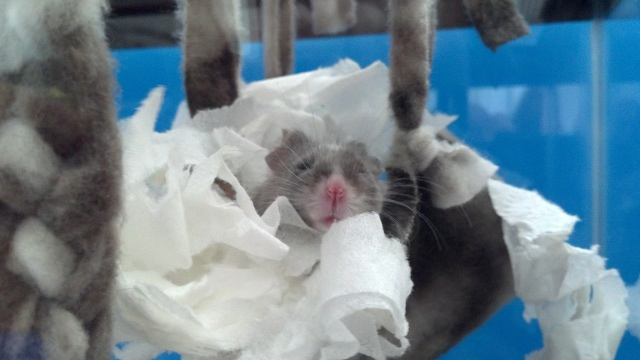 Did I hurt my mouse trying to help her?
Question
My little Loopy Luna C
Hi Natasha,
Ive
Did I hurt my mouse trying to help her?
Question
My little Loopy Luna C
Hi Natasha,
Ive
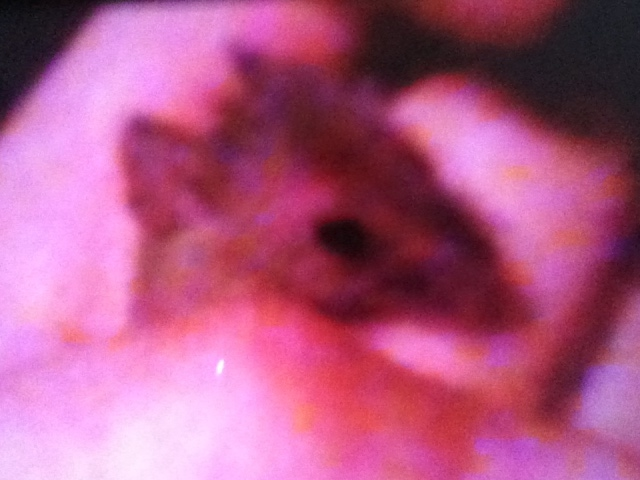 Dont split up rats
QuestionQUESTION: Dear natasha,
I have completely
Dont split up rats
QuestionQUESTION: Dear natasha,
I have completely
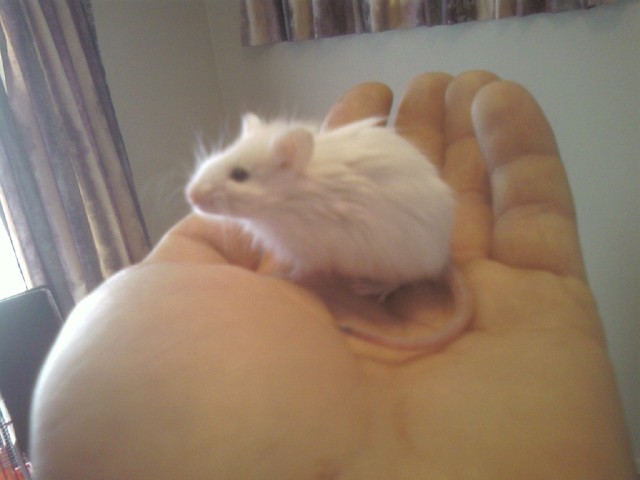 Young girl mouse is jumpy.
Question
Cutie
She is quite small. Seems to be timid. &
Young girl mouse is jumpy.
Question
Cutie
She is quite small. Seems to be timid. &
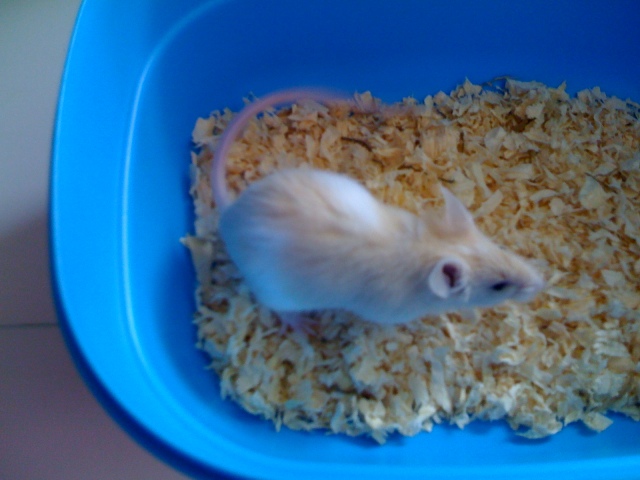 frightened mouse
Question
My mouse
Hi Natasha,
Two days ago, I bought
frightened mouse
Question
My mouse
Hi Natasha,
Two days ago, I bought
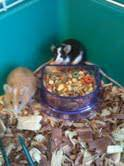 Another mouse?
Question
This is both of my mic Is she pregnant?
Another mouse?
Question
This is both of my mic Is she pregnant?